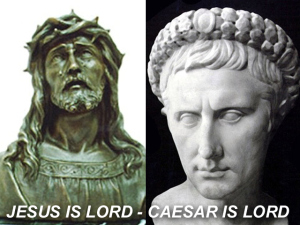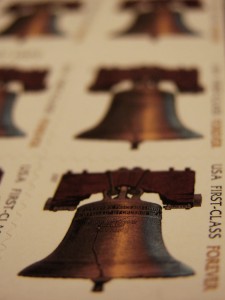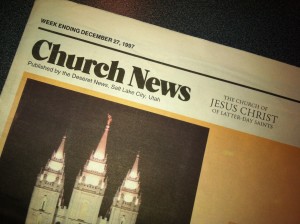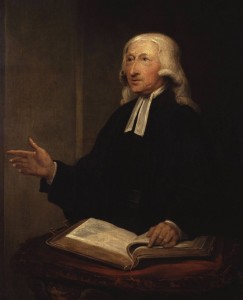Foundational to the Mormon gospel is the existence of Heavenly Mother, the spouse and counterpart of Mormonism’s Heavenly Father. When Mormon Apostle Erastus Snow taught on this concept in 1878, he explained that God is a component being, consisting of both male and female “parts.”
While Apostle Snow’s remarks could be misunderstood, I believe that consideration of his fuller argument (supplied below) suggests that he was talking about social unity in the Godhead, not a blending of male and female into one Being or essence.
Beginning with the idea that the creation of Adam and Eve in God’s image necessitated a male/female Creator God, Apostle Snow’s argument reached its logical (?) end:
“…there can be no God except he is composed of the man and woman united, and there is not in all the eternities that exist, nor ever will be, a God in any other way. I have another description: There never was a God, and there never will be in all eternities, except they are made of these two component parts; a man and a woman; the male and the female.”
Erastus Snow’s Sunday morning discourse provides an unfortunate real-life example of something Paul wrote about in Romans 1; this Mormon apostle exchanged the glory of the immortal God for images resembling mortal man, worshiped and served the creature rather than the Creator, and taught others do likewise (see Romans 1:22-25).
 Man in His Image—Male and Female Created He Them
Man in His Image—Male and Female Created He Them
Discourse by Apostle Erastus Snow (excerpt)
And every organ adapted to its special use, and for its special purpose, and combining a whole, a grand union—a little kingdom composed of many kingdoms, united and constituting the grand whole, the being we call man, but which in the language of these Scriptures was called Adam—male and female created he them, and called their name Adam, which in the original, in which these Scriptures were written by Moses, signifies “the first man.” There was no effort at distinguishing between the one half and the other, and calling one man and the other woman. This was an after distinction, but the explanation of it is—one man, one being, and he called their name Adam. But he created them male and female, for they were one, and he says not unto the woman multiply, and to the man multiply, but he says unto them, multiply and reproduce your species, and replenish the earth. He speaks unto them as belonging together, as constituting one being, and as organized in his image and after his likeness. And the Apostle Paul, treating upon this subject in the same way, says that man was created in the likeness of God, and after the express image of his person. John, the Apostle, in writing the history of Jesus, speaks in the same way; that Jesus was in the likeness of his Father, and express image of his person. And if the revelations that God has made of himself to man, agree and harmonize upon this theory, and if mankind would be more believing, and accept the simple, plain, clear definition of Deity, and description of himself which he has given us, instead of hunting for some great mystery, and seeking to find out God where he is not and as he is not, we all might understand him. There is no great mystery about it; no more mystery about it than there is about ourselves, and our own relationship to our father and mother, and the relationship of our own children to us. That which we see before our eyes, and which we are experiencing from time to time, day to day, and year to year, is an exemplification of Deity.
“What,” says one, “do you mean we should understand that Deity consists of man and woman?” Most certainly I do. If I believe anything that God has ever said about himself, and anything pertaining to the creation and organization of man upon the earth, I must believe that Deity consists of man and woman. Now this is simplifying it down to our understanding, and the great Christian world will be ready to open their mouths and cry, “Blasphemy! Sacrilege!” Open wide their eyes and wide their mouths in the utmost astonishment. What! God a man and woman? The Shakers say he was, and Ann Lee says, “Christ came in the form of a man in the first place, and now comes in the form of a woman,” and she was that form.
Then these Christians—they say he has no form, neither body, parts nor passions. One party says he is a man, and the other says he is a woman. I say he is both. How do you know? I only repeat what he says of himself; that he created man in the image of God, male and female created he them, and he called their name Adam, which signifies in Hebrew, the first man. So that the beings we call Adam and Eve were the first man placed here on this earth, and their name was Adam, and they were the express image of God. Now, if anybody is disposed to say that the woman is in the likeness of God and that the man was not, and if vice versa, I say you are both wrong, or else God has not told us the truth.
I sometimes illustrate this matter by taking up a pair of shears, if I have one, but then you all know they are composed of two halves, but they are necessarily parts, one of another, and to perform their work for each other, as designed, they belong together, and neither one of them is fitted for the accomplishment of their works alone. And for this reason says St. Paul, “the man is not without the woman, nor the woman without the man in the Lord.” In other words, there can be no God except he is composed of the man and woman united, and there is not in all the eternities that exist, nor ever will be, a God in any other way. I have another description: There never was a God, and there never will be in all eternities, except they are made of these two component parts; a man and a woman; the male and the female. (Journal of Discourses 19:269-270)
—-
What do Christians believe it means to be made in the image of God?
Conformed to His Image by Greg Bailey
The Image of God from Tabletalk Magazine
 The LDS Church has issued a Q&A regarding China:
The LDS Church has issued a Q&A regarding China:






